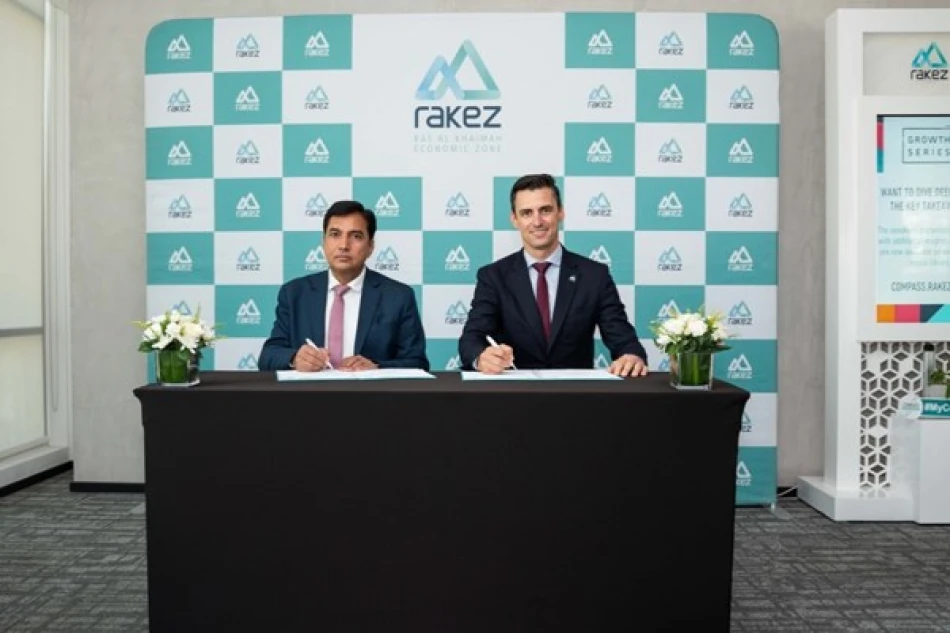
Rakez and Rana Partner to Establish Erisha Smart Manufacturing Complex in Ras Al Khaimah
UAE's Ras Al Khaimah Lands Major Electric Vehicle Manufacturing Hub in $2 Billion Green Energy Push
Ras Al Khaimah has secured a transformative industrial partnership that positions the UAE emirate as a regional manufacturing powerhouse for electric vehicles and renewable energy technologies. The Erisha Smart Manufacturing Complex, spanning 15 million square feet, represents one of the largest foreign direct investments in the emirate's industrial sector and signals the UAE's accelerating pivot toward green technology leadership in the Middle East.
A Strategic Alliance Reshaping Regional Manufacturing
The Ras Al Khaimah Economic Zones Authority (RAKEZ) has formalized a strategic partnership with India's Rana Group, a construction and infrastructure conglomerate, to establish what officials describe as a comprehensive smart manufacturing ecosystem. The agreement centers on expanding operations for Erisha E-Mobility, the group's electric vehicle subsidiary, across Middle Eastern and African markets while maintaining its established Indian operations.
The signing ceremony at the Compass Business Center marked more than just a lease agreement—it represented a calculated move to capture the region's emerging electric vehicle market before competitors establish dominance. With regional EV adoption still in early stages, the timing positions Ras Al Khaimah to become the manufacturing backbone for the Middle East's green transportation transition.
Beyond Electric Vehicles: A Multi-Sector Industrial Vision
Advanced Technology Integration
The Erisha Complex will house advanced manufacturing capabilities extending beyond traditional automotive production. The facility plans to integrate hydrogen vehicle production, renewable energy component manufacturing, and semiconductor fabrication—sectors experiencing explosive global demand amid supply chain diversification efforts.
This multi-technology approach mirrors successful industrial strategies employed by Singapore's Jurong Industrial Estate and China's Shenzhen Special Economic Zone, where clustering complementary technologies creates synergistic innovation environments.
Comprehensive Infrastructure Development
The project's scope extends beyond manufacturing floors to include residential, commercial, educational, healthcare, and financial facilities. This integrated approach addresses a critical challenge facing industrial developments in emerging markets: attracting and retaining skilled international talent requires comprehensive living and working ecosystems.
The inclusion of medical colleges, hospitals, shopping centers, and community service centers suggests long-term confidence in the project's sustainability and growth potential—infrastructure investments typically requiring decades to generate returns.
Market Implications and Regional Competition
Positioning Against Regional Rivals
This development intensifies competition among Gulf states for green technology manufacturing leadership. Saudi Arabia's NEOM project and Qatar's industrial diversification efforts have dominated headlines, but Ras Al Khaimah's pragmatic approach—partnering with established manufacturers rather than building from scratch—may prove more immediately effective.
The UAE's established logistics infrastructure, particularly Dubai's port and aviation connectivity, provides Erisha with immediate access to African and Asian markets that larger, more isolated projects cannot match.
Investment Climate Indicators
RAKEZ CEO Rami Jallad's comments reveal significant foreign investor interest, citing increased inquiries from Chinese, Singaporean, and Indian developers over the past year. This trend suggests the UAE's industrial zones are successfully competing against traditional manufacturing hubs by offering political stability, modern infrastructure, and competitive operational costs.
The willingness of international manufacturers to commit to large-scale, long-term projects in the UAE reflects growing confidence in the region's economic diversification strategies and regulatory environment.
Broader Economic Transformation Strategy
The Erisha partnership aligns with the UAE's National Strategy 2071 and carbon neutrality commitments, but represents more than environmental positioning. By establishing manufacturing capabilities for next-generation technologies, Ras Al Khaimah is building economic resilience against oil price volatility while creating high-skilled employment opportunities.
Dr. Darshan Rana's emphasis on "sustainable and technologically advanced manufacturing ecosystems" indicates recognition that future industrial competitiveness depends on environmental credentials—increasingly crucial for accessing European and North American markets with stringent sustainability requirements.
Challenges and Success Factors
The project's success will largely depend on execution speed and talent acquisition. Global semiconductor shortages and supply chain disruptions have created opportunities for new manufacturing hubs, but these windows may close as established producers expand capacity.
The integration of educational facilities suggests awareness that skilled workforce development cannot be imported indefinitely—sustainable industrial growth requires local talent cultivation. This long-term perspective distinguishes serious industrial development from speculative ventures.
If successful, the Erisha Complex could establish a template for comprehensive industrial development that other emerging markets will likely study and replicate, potentially positioning Ras Al Khaimah as an unexpected leader in sustainable manufacturing innovation.
Most Viewed News

 Layla Al Mansoori
Layla Al Mansoori






